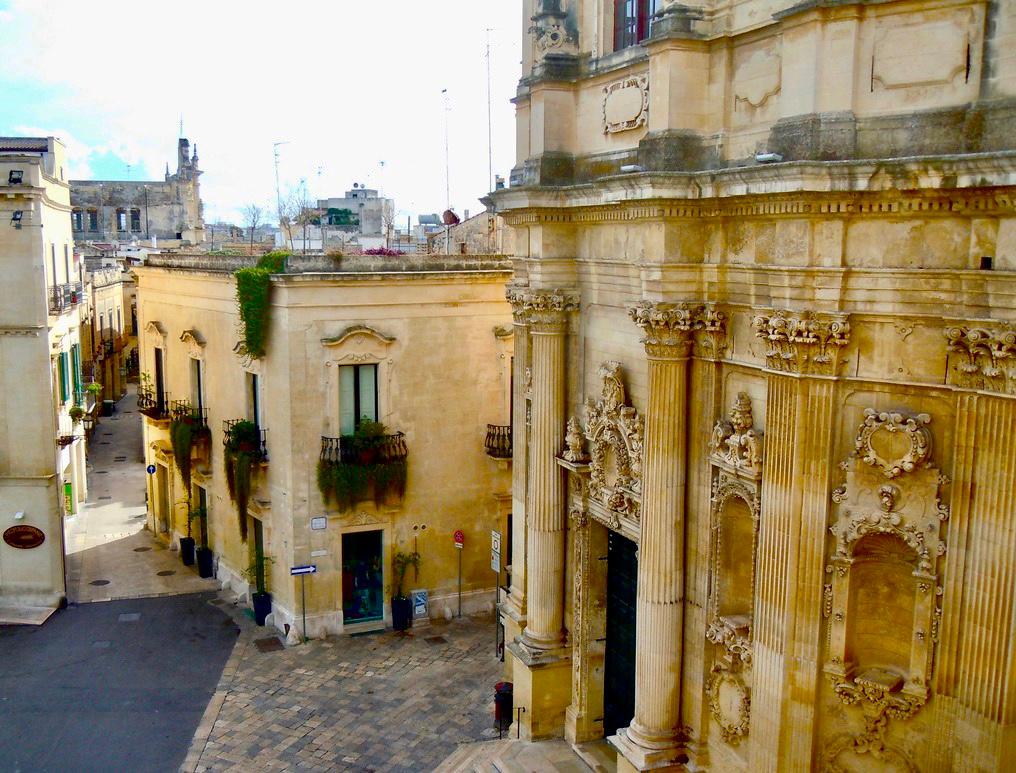TRAVEL IN PUGLIA

Make no mistake Puglia is hot. And where is it you ask? The heel of Italy is where one finds the region of Puglia, once part of Magna Grecia as Sicily was but with less evidence of that occupation apart from the grand centuries old olive trees that line the highway as you drive from Bari to Otranto. Many of these trees are 800+ years old and seem to have personalities of their own. Puglia is so hot that the olive presses are often found under ground as evidenced when you wander the promontory of Gallipoli and can visit one.
But Puglia is hot because they have masserie. What is that you ask? Masserie once fortified farm structures dating from 15th-18th C are constructed of limestone and often painted white or are left to yellow golden color with age. To the benefit of travelers today many of them have been turned into delightful accommodations in all price points.
The architecture of a masseria is a mix of Greek, Moorish and Spanish influences and no two are alike. Built with protected inner courtyards they were designed to house families of workers and animals together and to protect them from the raiders. Remember, Puglia is surrounded by water as both the Adriatic and Ionian seas circle this region and it was not uncommon for raiders and mauraders to arrive, take, pilage, and often mix with the populations and stay. Protection from the masserie was paramount to survival, which is why no masseria worth its masonry was build along the coast.
As you wander these beautiful and intrequing structures you find niches and stone walls all wrapped into a safe haven with shade and privacy. Colors range from tans to beiges, whites and neutrals and with accents of bold spice and brillant pinks and turquoises. Styles change as you switch hotels from bohemian chic to sophisticated even down to a maitre in a tux. But for most it is a relaxing environment, casual and cool, so just pull up a pillow and relax.
Which brings me to how long to stay? For me one week was enough to cover the historical visits required while visiting Puglia. I suggest a stay of just a few days in the Lecce area and then spend a few days further north. If your vacation is about rest and recharge, and beach then add as many extra relaxing days as you see fit. I need to mention the other architectural structures are trulli - those wizard of OZesque structures with low entry clearence and a pointed roof which are found in the val d' Itria, which includes Alberobello. This is a Unesco world heritage area enchanting yes, but once is probably enough.
As a region it is easy to drive around in as long as you stay along the Adriatic side and follow the highway from Bari as the infrastructure is good all the way to Otranto. The roads in the Salento province need a bit of work but that is part of this territory. Villages are sweet and sincere , and people gracious and welcoming. And the foods and wines are so very good and worth the trip . Negroamaro is an indigenous grape which produces a full bodied red and has been growing there for 1500 years. Primitivo is the other primary red grape , possibly related to Zinfendel. Puglia produces renown rosati and we all know drinking rose` goes with heat. Whites are produced in Puglia but here it is really about the reds and rosati.
 Puglian cuisine is heavy on antipasti so try not to over load on that course ( but you could and would). By now we all are familiar with burrata what you thought was mozzarella, we now know is really much more flavourful and delicate with all that cream inside. Orecchiette ( little ears) pasta with sausage and broccoli rabe as THE classic plate.
Puglian cuisine is heavy on antipasti so try not to over load on that course ( but you could and would). By now we all are familiar with burrata what you thought was mozzarella, we now know is really much more flavourful and delicate with all that cream inside. Orecchiette ( little ears) pasta with sausage and broccoli rabe as THE classic plate.
One more thing I would like to add; I would not go all the way to Puglia and miss going to Matera in Basilicata. Matera is one of the most unique places I have been to in Italy. More on that later.




















